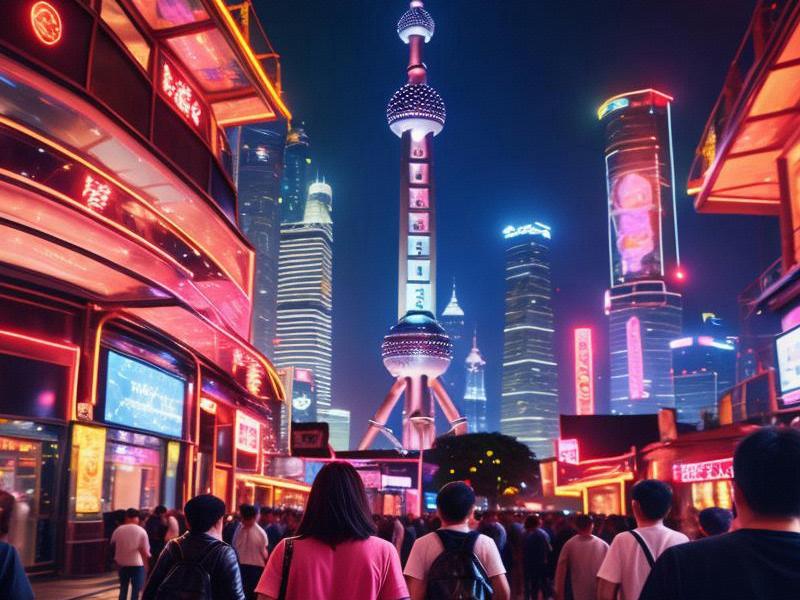
Shanghai, the bustling metropolis on the banks of the Huangpu River, has long been a symbol of modernity and progress in China. Over the years, it has transformed from a traditional port city into a global financial and cultural center. One of the most striking aspects of this transformation is the city's entertainment landscape, which has flourished and diversified to cater to the tastes of its diverse population.
The entertainment industry in Shanghai is a multi-billion-dollar sector that encompasses a wide range of activities, from traditional cultural performances to cutting-edge digital media. The city's vibrant nightlife, cultural events, and the rapid development of the entertainment industry have made it a magnet for both domestic and international audiences.
One of the key features of Shanghai's entertainment scene is its vibrant nightlife. The city boasts a plethora of nightclubs, bars, and live music venues that offer a wide range of entertainment options. From the upscale lounges of the Bund to the trendy bars in the French Concession, Shanghai's nightlife is as diverse as its population. These venues not only provide a place for people to unwind after a long day but also serve as social hubs where friends and colleagues gather to network and socialize.
The cultural events in Shanghai are another major draw for visitors and locals alike. The city hosts a wide range of cultural festivals, art exhibitions, and theater productions throughout the year. These events not only showcase the rich cultural heritage of Shanghai but also highlight the city's commitment to fostering a vibrant cultural scene. For instance, the Shanghai International Film Festival, one of the oldest and most prestigious film festivals in Asia, attracts filmmakers and cinephiles from around the world. Similarly, the Shanghai Art Fair is a major event that brings together artists, collectors, and art enthusiasts from across the globe.
上海龙凤419自荐 The rapid development of the entertainment industry in Shanghai has been driven by a combination of factors, including government support, private investment, and the city's strategic location. The Chinese government has recognized the potential of the entertainment industry as a key driver of economic growth and has implemented various policies to support its development. These include tax incentives for entertainment companies, funding for cultural projects, and the establishment of special economic zones for the entertainment industry.
Private investment has also played a crucial role in the growth of Shanghai's entertainment industry. Many domestic and international companies have set up operations in the city, attracted by its large consumer base, favorable business environment, and access to talent. This has led to the emergence of a number of successful entertainment companies in Shanghai, ranging from film production studios to digital media platforms.
The strategic location of Shanghai has further contributed to the growth of its entertainment industry. As a major gateway to China, the city offers easy access to the country's vast consumer market. This has made it an attractive destination for international entertainment companies looking to expand their presence in China. At the same time, the city's well-developed infrastructure, including its advanced transportation network and telecommunications systems, has facilitated the growth of the entertainment industry.
上海龙凤419杨浦 One of the most notable trends in Shanghai's entertainment industry is the increasing popularity of digital media. With the rapid growth of the internet and mobile technology, digital media has become an integral part of the entertainment landscape. Shanghai is home to a number of leading digital media companies, including video streaming platforms, online gaming companies, and social media platforms. These companies have revolutionized the way people consume entertainment, offering them a wide range of content at their fingertips.
Another trend in Shanghai's entertainment industry is the growing emphasis on cultural tourism. The city's rich cultural heritage and vibrant entertainment scene make it an ideal destination for tourists seeking to experience the best of Chinese culture. To capitalize on this, the city has developed a number of cultural tourism initiatives, including themed tours, cultural festivals, and heritage preservation projects. These initiatives have not only boosted tourism revenue but also helped to promote Shanghai's cultural heritage on the global stage.
The entertainment industry in Shanghai has also played a significant role in promoting social change and fostering a sense of community. Many entertainment companies in the city have used their platforms to raise awareness about social issues, promote cultural exchange, and support local artists and musicians. For instance, some music festivals in Shanghai have featured performances by local bands and solo artists, providing them with a platform to showcase their talent and connect with audiences.
爱上海同城对对碰交友论坛 In addition, the entertainment industry in Shanghai has contributed to the city's economic development by creating jobs and generating revenue. The sector employs a large number of people, ranging from performers and technicians to marketing and administrative staff. It also generates significant revenue through ticket sales, merchandise, and advertising. This has made the entertainment industry an important contributor to Shanghai's economy.
However, the rapid growth of the entertainment industry in Shanghai has also brought about certain challenges. One of the main challenges is the need to balance commercial interests with cultural authenticity. As the industry becomes more commercialized, there is a risk of losing sight of the cultural values that underpin its success. To address this, many entertainment companies in Shanghai are working to preserve and promote traditional cultural practices while also embracing modern trends and innovations.
Another challenge is the impact of digital media on traditional forms of entertainment. While digital media has opened up new opportunities for creators and consumers, it has also disrupted traditional industries such as film, television, and music. To stay relevant in this changing landscape, traditional entertainment companies in Shanghai are adopting new technologies and business models to reach wider audiences and stay competitive.
